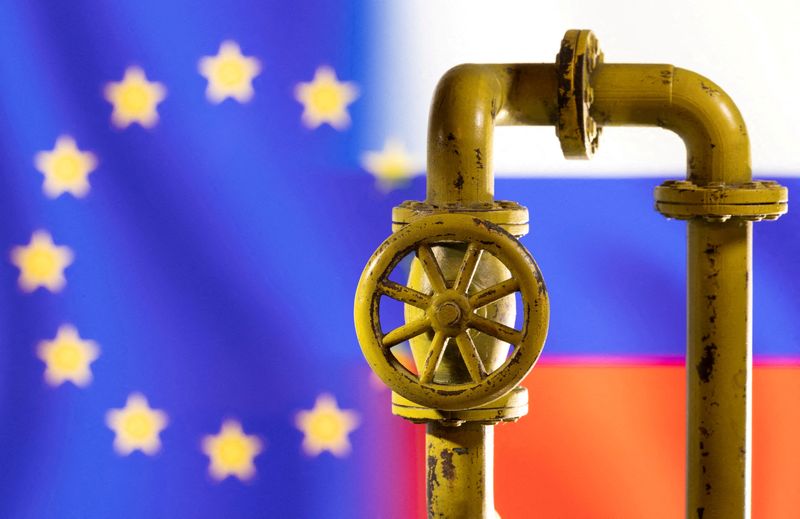By Nora Buli and Nina Chestney
OSLO/LONDON (Reuters) - Russia maintained gas flows through key pipeline routes into Europe on Monday, despite uncertainty over payment terms and as European leaders urged further sanctions against Moscow amid allegations of war crimes in Ukraine.
Physical gas flows through the Yamal-Europe pipeline, at Germany's Mallnow border point see-sawed over the weekend and last stood at zero, data from operator Gascade showed.
Nominations, or requests, for Russian gas deliveries via Slovakia's Velke Kapusany entry point from Ukraine were steady on Monday at 967,954 MWh/day, as were flows through the Nord Stream 1 pipeline to Germany at 73,379,286 kWh/h.
Russian state-owned energy giant Gazprom (MCX:GAZP) said it was continuing to supply natural gas to Europe via Ukraine in line with requests from European consumers.
However, questions remained over future deliveries in light of the Kremlin's demand that buyers start paying Gazprom in roubles.
Slovakia's Prime Minister Eduard Heger confirmed over the weekend that his country would act in unison with the European Union against such payment demands.
The discovery of a mass grave and civilians shot dead at close range in the Ukrainian city of Bucha outside Kyiv, from which Russian forces recently withdrew, has spurred calls for tougher sanctions on Russia.
Russia has previously denied targeting civilians and has rejected allegations of war crimes. Moscow claims the killings near Kyiv were "staged" to sully Russia's name.
Meanwhile, Germany, which gets around 40% of its gas from Russia, is working "every day" towards being able to ban Russian energy, the economy minister said on Monday.
Germany has already activated an emergency plan that could lead to gas rationing if supplies drop too low but German Finance Minister Christian Lindner said an encompassing ban on all Russian energy imports would inflict more economic damage on EU member states than on Russia.
Germany will face a steep recession if there is a stop to imports or delivery of Russian gas and oil, a top German bank lobby warned.
France's economic analysis council said a hefty EU-wide tariff on Russian energy imports could prove more efficient than an outright ban, although even a full embargo would have a limited impact on most countries.

The Conseil d'Analyse Economique said that a full energy ban could on average cause a loss of gross national income of 0.2-0.3%, working out to 100 euros ($110) per adult.
Italy, which is also heavily reliant on Russian gas, said it will not veto sanctions on Russian gas imports and said it has sufficient reserves to forego Russian gas supply over the next few months.